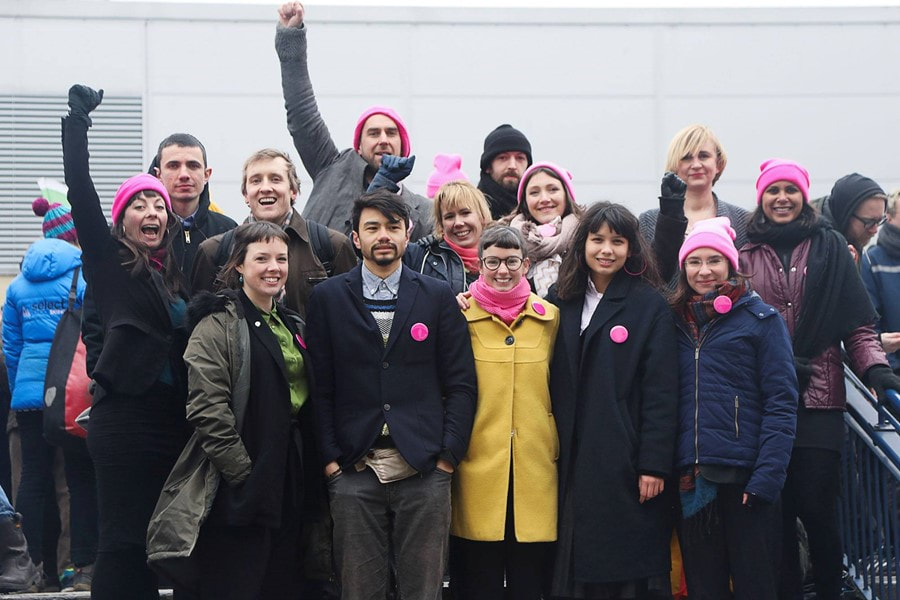|
In March 2017, 15 activists secured themselves around the wheel and wing of a plane to prevent the deportation of 64 people to Nigeria, Ghana and Sierra Leone. For preventing this flight, the ‘Stansted 15’ were convicted of ‘intentional disruption of services at an aerodrome’ on 10th December 2018, a charge drawn from terror legislation carrying a possible life sentence.
Following two months spent contemplating the possibility of life in prison, the 15 were finally handed community service and suspended sentences on February 6th of this year. Meanwhile, of those on the plane, 11 have now been granted legal right to remain, exposing the aggression and injustice of an immigration system lacking in both logic and humanity. By cutting a fence and blockading a stationary Titan Airways plane, the Stansted 15 endangered nobody, but extended a helping hand to people they did not know personally. With the trial now concluded, we see the suggested jailing of these peaceful protesters for what it was: the empty threat of a weak and fearful state. For such peaceful intervention, actual or threatened deprivation of liberty can never be justified. Even suspended sentences will have life-long implications for the activists, now subject to intensive work and travel restrictions. However, this story is about more than these 15 people. Lack of jail time in Wednesday's sentencing is a genuine relief, but the work of punishing the 15 and sowing fear among other activists has already been done. By instructing the jury to disregard evidence of harm prevented, Judge Christopher Morgan chose to make an example, telling other would-be activists that peaceful protest risks the rest of your life. In doing so, he has revealed that like most forms of state oppression, the racist Home Office policy of creating a ‘Hostile Environment’ for migrants is so weak, that simple acts of disobedience rooted in the wider public pose an intolerable threat to its very existence. If large numbers showed up to block every deportation flight, the process would be more expensive and more difficult to secure. Contracted airlines would refuse to take on this risk, forcing the Home Office to either cancel flights, or call upon the military to enforce deportations, no longer able to maintain the pretence of the 'civilised' and 'neutral' state. This is the true potential of mass direct action. The indefinite detention and deportation of undocumented migrants are excused by many British people because migrants are seen as exceptions, allowed here as a special favour, rather than having equal status and right to work. This kind of thinking undermines the struggle for better living conditions for all by ignoring the linked oppression of British and migrant workers, two groups who have more in common with one another than they ever could with bosses, landlords, parliamentarians or aristocrats, British or otherwise. That includes stay at home parents, the elderly and other non-working migrants, who play the same vital roles within the community, with responsibilities to those around them which are too often ignored. By defining people in terms of nationality, we remove their humanity and mask our common interests, keeping us separated by prejudice and unable to organise against those who truly reduce our quality of life. Migrant solidarity is more than anti-racism, but a starting point for an internationalist movement of ordinary people against the ruling class. The false division between British and non-British is perpetuated through racism and scapegoating to keep us separated, but no matter how much we might manage to improve conditions in any one country, we are not truly free until we are all free. Action across and in defiance of borders is necessary for the international working class to unite against capitalism’s enforced inequality. Only when our communities cooperate fully will we throw off the shackles of capitalism once and for all. In this spirit, we cannot allow the establishment to succeed in their heavy-handed attempts to stifle resistance and break our common cause. Instead, we must remember the outcome of the Stansted case, the righteous action of 15 activists and their effect on the lives of 11 people who narrowly avoided potentially life-threatening and inhuman disposal at the hand of the British state.
0 Comments
|
The Rag
Archives of print news from The Rag, newspaper of the Revolutionary Anarchist Group, Birmingham ArchivesCategories
All
|


 RSS Feed
RSS Feed
